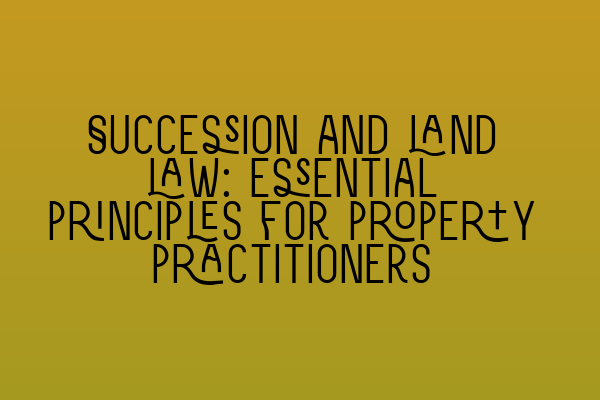Succession and Land Law: Essential Principles for Property Practitioners
As property practitioners, having a solid understanding of succession and land law is essential for providing effective legal advice and assistance to clients. Succession law deals with the transfer of property after death, while land law governs the rights and obligations associated with owning and transferring land. In this article, we will explore the key principles and concepts in succession and land law that every property practitioner should be familiar with.
Succession Law
Succession law, also known as estate planning or probate law, revolves around the transfer of property rights after the death of an individual. It encompasses various legal mechanisms and tools that facilitate the distribution of assets and the fulfillment of the deceased’s wishes. Understanding succession law is crucial for property practitioners who handle wills, estates, and trust matters.
Wills and Testaments
A will, also referred to as a testament, is a legal document that outlines an individual’s wishes regarding the distribution of their assets after death. By crafting a valid will, individuals can ensure that their property is distributed according to their intentions and preferences. Property practitioners play a vital role in assisting clients with will creation, ensuring compliance with legal requirements and minimizing the potential for disputes and challenges.
To test your knowledge on wills and testaments, check out our SQE 1 Practice Exam Questions.
Intestacy and Letters of Administration
In cases where an individual dies without leaving a valid will, the law determines how their estate will be distributed. This is known as intestacy. Property practitioners must be well-versed in intestacy rules, as they guide the distribution process in the absence of a will. Additionally, obtaining letters of administration, which grant legal authority to manage and distribute the estate, is an essential step in the intestacy process.
Land Law
Land law governs the rights, interests, and obligations associated with owning, using, and transferring land. It encompasses a wide range of legal principles and concepts that property practitioners must be familiar with to provide sound advice and assistance to clients in property transactions.
Ownership and Co-ownership
Understanding the various forms of property ownership is crucial in land law. Whether it is freehold, leasehold, or co-ownership, each type carries distinct rights and responsibilities for the parties involved. Property practitioners must guide clients through the complexities of property ownership, ensuring they have a clear understanding of their rights and obligations.
To brush up on your knowledge of ownership and co-ownership, explore our SQE 1 Practice Mocks FLK1 FLK2.
Conveyancing and Transfers
Conveyancing is the legal process of transferring ownership of land from one party to another. Property practitioners are heavily involved in this process, ensuring that all necessary legal requirements are met, conducting property searches, and facilitating the transfer of title and associated documents. Having a solid understanding of conveyancing is vital for property practitioners to successfully navigate property transactions.
If you’re preparing for a career in property law, make sure to explore our comprehensive SQE 2 Preparation Courses to excel in your legal studies.
Leases and Tenancies
Leases and tenancies represent contractual arrangements in which a tenant, or lessee, has the right to use and occupy a property for a specific period of time. Understanding the complexities of lease agreements, statutory rights of tenants, and landlord obligations is essential for property practitioners representing both landlords and tenants.
Staying Up-to-Date
To excel in the field of property law, it is vital for property practitioners to stay up-to-date with the latest developments, case law, and regulatory changes. Regularly participating in professional development programs and courses can help enhance your knowledge and expertise in this ever-evolving field.
To stay ahead, consider enrolling in our comprehensive SQE 1 Preparation Courses that cover all the essential topics and provide invaluable guidance for success in the SRA SQE exams.
Conclusion
Succession and land law are integral areas of practice for property practitioners. By understanding the essential principles and concepts in these areas, property practitioners can provide effective legal advice and assistance to clients in matters involving wills, estates, trusts, property transactions, and more. Continuous learning and staying up-to-date with the latest developments in these specialized areas are key to excelling in the field of property law.
For information about upcoming SRA SQE exam dates, visit our article on SRA SQE Exam Dates.
